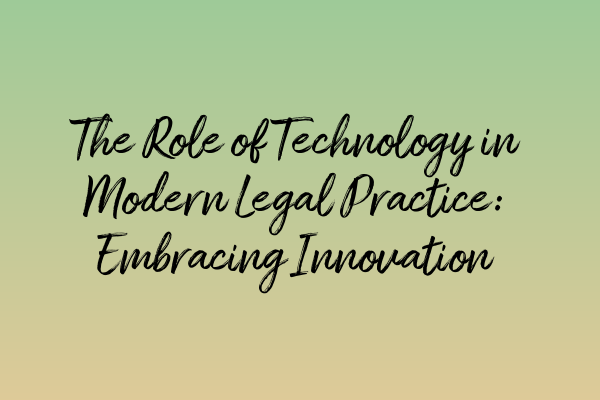The Role of Technology in Modern Legal Practice: Embracing Innovation
In today’s rapidly advancing digital world, technology plays a crucial role in transforming various industries, and the legal profession is no exception. By embracing innovation and leveraging technology, modern legal practices are able to streamline their processes, enhance efficiency, and deliver better services to their clients. In this blog post, we will explore the role of technology in modern legal practice and the benefits it brings.
One of the significant ways in which technology has revolutionized legal practice is through the digitization of documents and case management systems. Gone are the days of sifting through mountains of paper files; technology allows solicitors to store and access documents electronically, improving organization and saving valuable time. Electronic case management systems enable solicitors to easily track case progress, manage deadlines, and collaborate with colleagues, all at the click of a button.
Another area where technology has made a profound impact is in legal research. With the advent of online databases and search engines specifically tailored for legal professionals, solicitors can now conduct extensive research in a fraction of the time it used to take. These platforms provide access to an extensive library of legal materials, including case law, statutes, and academic journals. By harnessing the power of technology, solicitors can stay up-to-date with the ever-evolving legal landscape and provide their clients with accurate and reliable advice.
Furthermore, technology has transformed the way legal services are delivered to clients. With the rise of virtual meetings and video conferencing tools, solicitors can now connect with clients remotely, breaking down geographical barriers and saving both parties valuable time and resources. This has been particularly beneficial for clients who reside in rural areas or have mobility constraints, as they can receive legal advice from the comfort of their own homes.
Additionally, technology has streamlined the internal operations of law firms, leading to increased efficiency and productivity. Time-tracking and billing software allow solicitors to easily record and manage their billable hours, ensuring accurate invoicing and reducing administrative burdens. Furthermore, cloud-based storage solutions have enabled solicitors to access their files and work remotely, fostering flexibility and work-life balance.
However, it is important to note that while technology brings numerous benefits to the legal profession, it also presents challenges, particularly in the realm of cybersecurity. With the increasing reliance on technology, law firms must be vigilant in safeguarding sensitive client data. Implementing robust cybersecurity measures and regularly training staff on best practices can help mitigate the risks associated with data breaches and protect both the firm’s reputation and client confidentiality.
In conclusion, the role of technology in modern legal practice cannot be overstated. By embracing innovation and leveraging technology tools, law firms can enhance their efficiency, improve client services, and stay ahead of the competition. The digitization of documents and case management systems, online legal research platforms, virtual meetings, and streamlined internal operations are just a few examples of how technology has reshaped the legal landscape. It is essential for solicitors to adapt to these technological advancements and continually explore new ways to integrate technology into their practices.
If you found this article useful and would like to learn more about the legal profession, check out these related articles:
– Rights of the Accused: Protecting Individual Liberties in Criminal Proceedings
– Magistrates’ Court vs Crown Court: Understanding Key Differences
– Protecting Vulnerable Witnesses in Criminal Trials: Best Practices and Legal Safeguards
– Unraveling the Complexities of UK Bail Laws
– Cross-Examination Techniques: Mastering the Art of Questioning Witnesses
Feel free to explore these articles to expand your knowledge and gain valuable insights into various aspects of the legal profession.
Disclaimer: This blog post is provided for informational purposes only and does not constitute legal advice. Consult a qualified solicitor for professional advice tailored to your specific situation.


Leave a Reply